Impact of Brexit on UK Law and Parliamentary Sovereignty
VerifiedAdded on 2023/06/11
|8
|2091
|97
AI Summary
This report analyzes the impact of Brexit on UK law and parliamentary sovereignty. It discusses the history of UK legal framework, branches of government, and EU impact on UK sovereignty. It also examines the breaking point and Thoburn Vs Sunderland city council case.
Contribute Materials
Your contribution can guide someone’s learning journey. Share your
documents today.
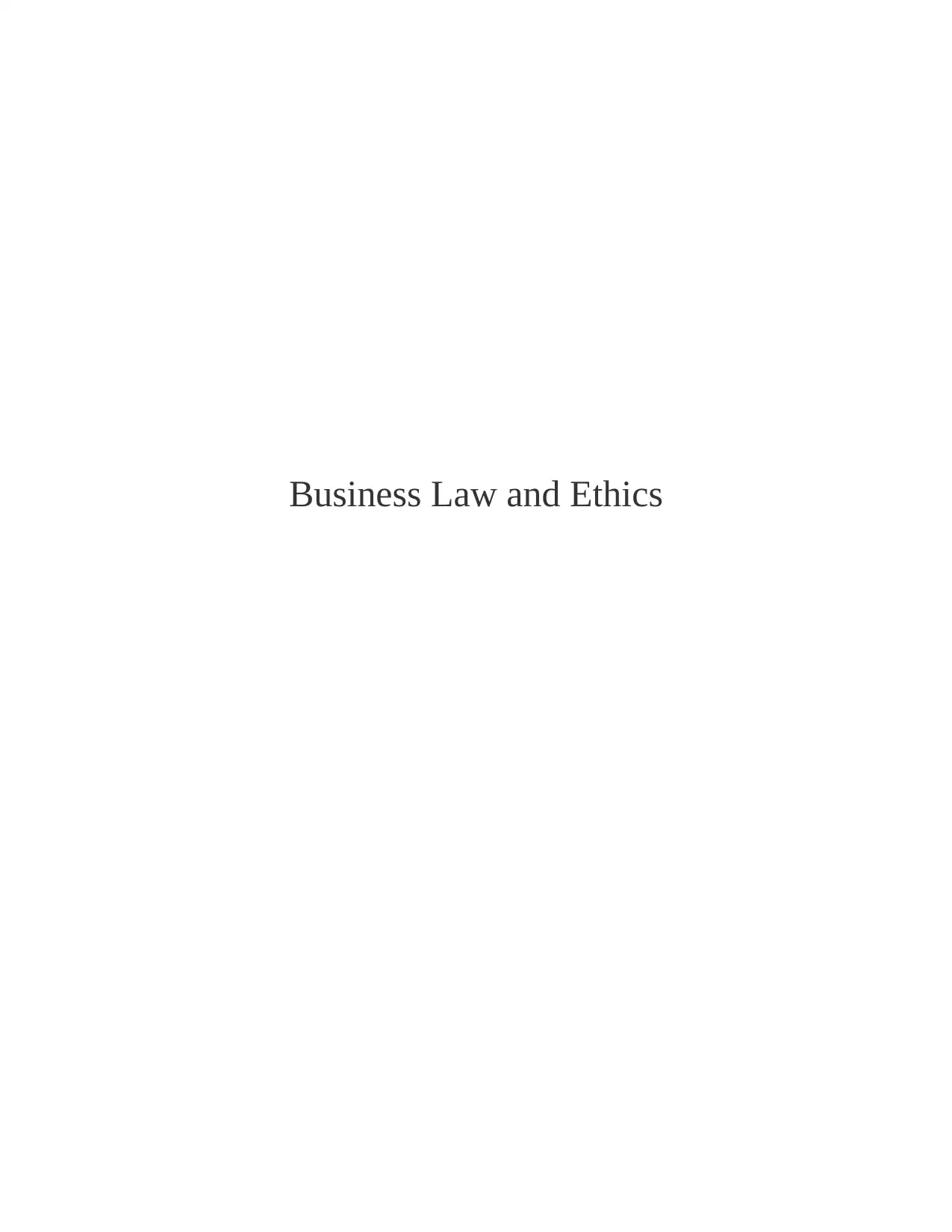
Business Law and Ethics
Secure Best Marks with AI Grader
Need help grading? Try our AI Grader for instant feedback on your assignments.
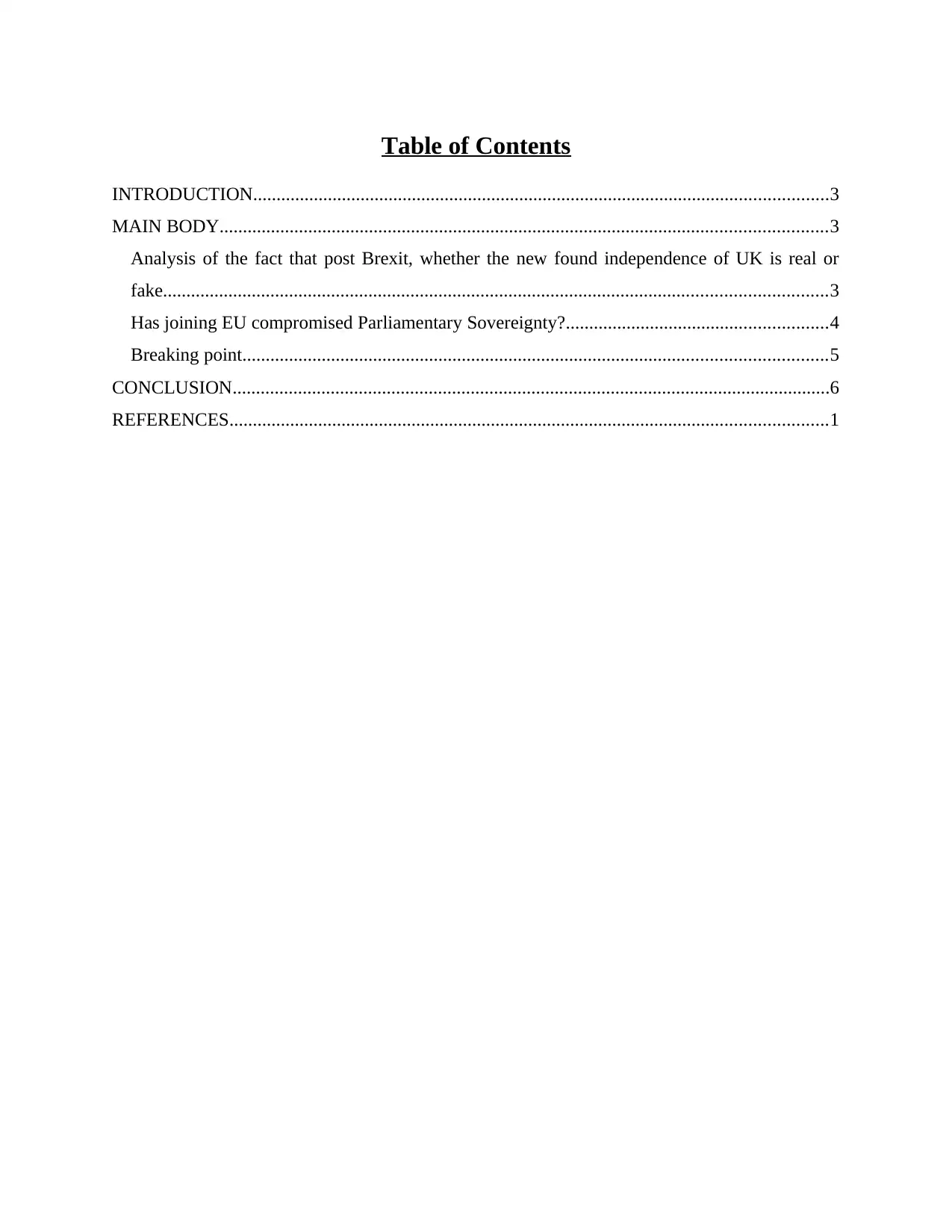
Table of Contents
INTRODUCTION...........................................................................................................................3
MAIN BODY..................................................................................................................................3
Analysis of the fact that post Brexit, whether the new found independence of UK is real or
fake..............................................................................................................................................3
Has joining EU compromised Parliamentary Sovereignty?........................................................4
Breaking point.............................................................................................................................5
CONCLUSION................................................................................................................................6
REFERENCES................................................................................................................................1
INTRODUCTION...........................................................................................................................3
MAIN BODY..................................................................................................................................3
Analysis of the fact that post Brexit, whether the new found independence of UK is real or
fake..............................................................................................................................................3
Has joining EU compromised Parliamentary Sovereignty?........................................................4
Breaking point.............................................................................................................................5
CONCLUSION................................................................................................................................6
REFERENCES................................................................................................................................1
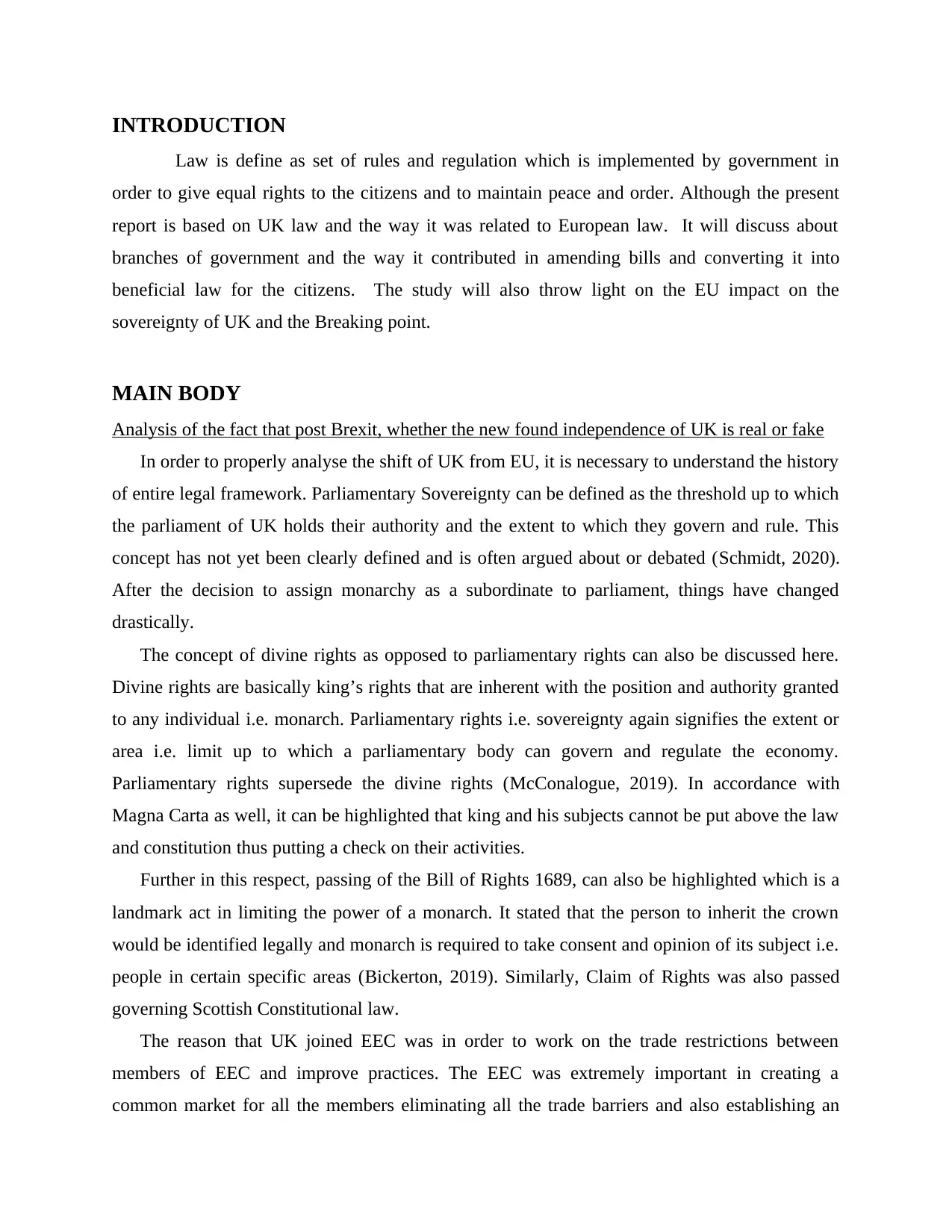
INTRODUCTION
Law is define as set of rules and regulation which is implemented by government in
order to give equal rights to the citizens and to maintain peace and order. Although the present
report is based on UK law and the way it was related to European law. It will discuss about
branches of government and the way it contributed in amending bills and converting it into
beneficial law for the citizens. The study will also throw light on the EU impact on the
sovereignty of UK and the Breaking point.
MAIN BODY
Analysis of the fact that post Brexit, whether the new found independence of UK is real or fake
In order to properly analyse the shift of UK from EU, it is necessary to understand the history
of entire legal framework. Parliamentary Sovereignty can be defined as the threshold up to which
the parliament of UK holds their authority and the extent to which they govern and rule. This
concept has not yet been clearly defined and is often argued about or debated (Schmidt, 2020).
After the decision to assign monarchy as a subordinate to parliament, things have changed
drastically.
The concept of divine rights as opposed to parliamentary rights can also be discussed here.
Divine rights are basically king’s rights that are inherent with the position and authority granted
to any individual i.e. monarch. Parliamentary rights i.e. sovereignty again signifies the extent or
area i.e. limit up to which a parliamentary body can govern and regulate the economy.
Parliamentary rights supersede the divine rights (McConalogue, 2019). In accordance with
Magna Carta as well, it can be highlighted that king and his subjects cannot be put above the law
and constitution thus putting a check on their activities.
Further in this respect, passing of the Bill of Rights 1689, can also be highlighted which is a
landmark act in limiting the power of a monarch. It stated that the person to inherit the crown
would be identified legally and monarch is required to take consent and opinion of its subject i.e.
people in certain specific areas (Bickerton, 2019). Similarly, Claim of Rights was also passed
governing Scottish Constitutional law.
The reason that UK joined EEC was in order to work on the trade restrictions between
members of EEC and improve practices. The EEC was extremely important in creating a
common market for all the members eliminating all the trade barriers and also establishing an
Law is define as set of rules and regulation which is implemented by government in
order to give equal rights to the citizens and to maintain peace and order. Although the present
report is based on UK law and the way it was related to European law. It will discuss about
branches of government and the way it contributed in amending bills and converting it into
beneficial law for the citizens. The study will also throw light on the EU impact on the
sovereignty of UK and the Breaking point.
MAIN BODY
Analysis of the fact that post Brexit, whether the new found independence of UK is real or fake
In order to properly analyse the shift of UK from EU, it is necessary to understand the history
of entire legal framework. Parliamentary Sovereignty can be defined as the threshold up to which
the parliament of UK holds their authority and the extent to which they govern and rule. This
concept has not yet been clearly defined and is often argued about or debated (Schmidt, 2020).
After the decision to assign monarchy as a subordinate to parliament, things have changed
drastically.
The concept of divine rights as opposed to parliamentary rights can also be discussed here.
Divine rights are basically king’s rights that are inherent with the position and authority granted
to any individual i.e. monarch. Parliamentary rights i.e. sovereignty again signifies the extent or
area i.e. limit up to which a parliamentary body can govern and regulate the economy.
Parliamentary rights supersede the divine rights (McConalogue, 2019). In accordance with
Magna Carta as well, it can be highlighted that king and his subjects cannot be put above the law
and constitution thus putting a check on their activities.
Further in this respect, passing of the Bill of Rights 1689, can also be highlighted which is a
landmark act in limiting the power of a monarch. It stated that the person to inherit the crown
would be identified legally and monarch is required to take consent and opinion of its subject i.e.
people in certain specific areas (Bickerton, 2019). Similarly, Claim of Rights was also passed
governing Scottish Constitutional law.
The reason that UK joined EEC was in order to work on the trade restrictions between
members of EEC and improve practices. The EEC was extremely important in creating a
common market for all the members eliminating all the trade barriers and also establishing an
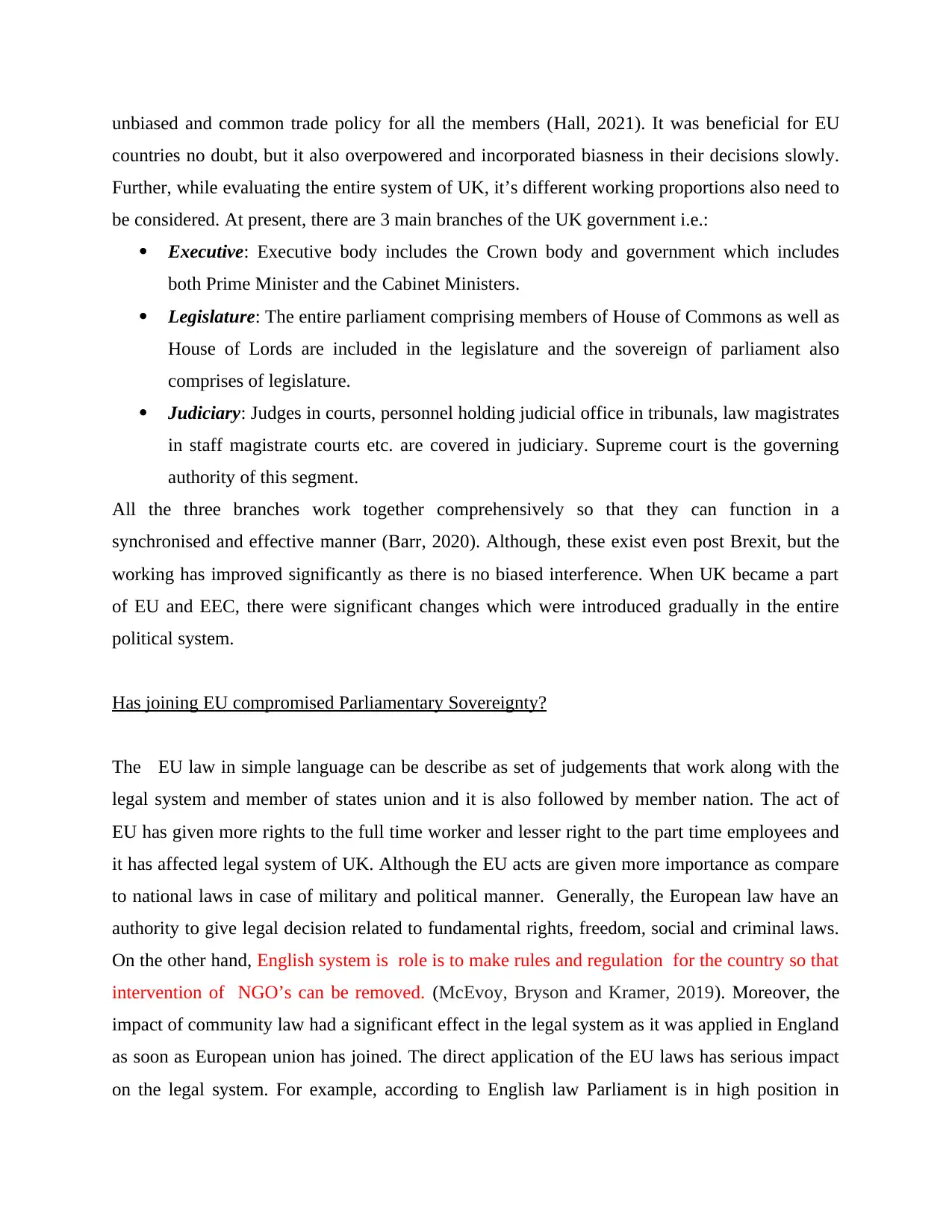
unbiased and common trade policy for all the members (Hall, 2021). It was beneficial for EU
countries no doubt, but it also overpowered and incorporated biasness in their decisions slowly.
Further, while evaluating the entire system of UK, it’s different working proportions also need to
be considered. At present, there are 3 main branches of the UK government i.e.:
Executive: Executive body includes the Crown body and government which includes
both Prime Minister and the Cabinet Ministers.
Legislature: The entire parliament comprising members of House of Commons as well as
House of Lords are included in the legislature and the sovereign of parliament also
comprises of legislature.
Judiciary: Judges in courts, personnel holding judicial office in tribunals, law magistrates
in staff magistrate courts etc. are covered in judiciary. Supreme court is the governing
authority of this segment.
All the three branches work together comprehensively so that they can function in a
synchronised and effective manner (Barr, 2020). Although, these exist even post Brexit, but the
working has improved significantly as there is no biased interference. When UK became a part
of EU and EEC, there were significant changes which were introduced gradually in the entire
political system.
Has joining EU compromised Parliamentary Sovereignty?
The EU law in simple language can be describe as set of judgements that work along with the
legal system and member of states union and it is also followed by member nation. The act of
EU has given more rights to the full time worker and lesser right to the part time employees and
it has affected legal system of UK. Although the EU acts are given more importance as compare
to national laws in case of military and political manner. Generally, the European law have an
authority to give legal decision related to fundamental rights, freedom, social and criminal laws.
On the other hand, English system is role is to make rules and regulation for the country so that
intervention of NGO’s can be removed. (McEvoy, Bryson and Kramer, 2019). Moreover, the
impact of community law had a significant effect in the legal system as it was applied in England
as soon as European union has joined. The direct application of the EU laws has serious impact
on the legal system. For example, according to English law Parliament is in high position in
countries no doubt, but it also overpowered and incorporated biasness in their decisions slowly.
Further, while evaluating the entire system of UK, it’s different working proportions also need to
be considered. At present, there are 3 main branches of the UK government i.e.:
Executive: Executive body includes the Crown body and government which includes
both Prime Minister and the Cabinet Ministers.
Legislature: The entire parliament comprising members of House of Commons as well as
House of Lords are included in the legislature and the sovereign of parliament also
comprises of legislature.
Judiciary: Judges in courts, personnel holding judicial office in tribunals, law magistrates
in staff magistrate courts etc. are covered in judiciary. Supreme court is the governing
authority of this segment.
All the three branches work together comprehensively so that they can function in a
synchronised and effective manner (Barr, 2020). Although, these exist even post Brexit, but the
working has improved significantly as there is no biased interference. When UK became a part
of EU and EEC, there were significant changes which were introduced gradually in the entire
political system.
Has joining EU compromised Parliamentary Sovereignty?
The EU law in simple language can be describe as set of judgements that work along with the
legal system and member of states union and it is also followed by member nation. The act of
EU has given more rights to the full time worker and lesser right to the part time employees and
it has affected legal system of UK. Although the EU acts are given more importance as compare
to national laws in case of military and political manner. Generally, the European law have an
authority to give legal decision related to fundamental rights, freedom, social and criminal laws.
On the other hand, English system is role is to make rules and regulation for the country so that
intervention of NGO’s can be removed. (McEvoy, Bryson and Kramer, 2019). Moreover, the
impact of community law had a significant effect in the legal system as it was applied in England
as soon as European union has joined. The direct application of the EU laws has serious impact
on the legal system. For example, according to English law Parliament is in high position in
Secure Best Marks with AI Grader
Need help grading? Try our AI Grader for instant feedback on your assignments.
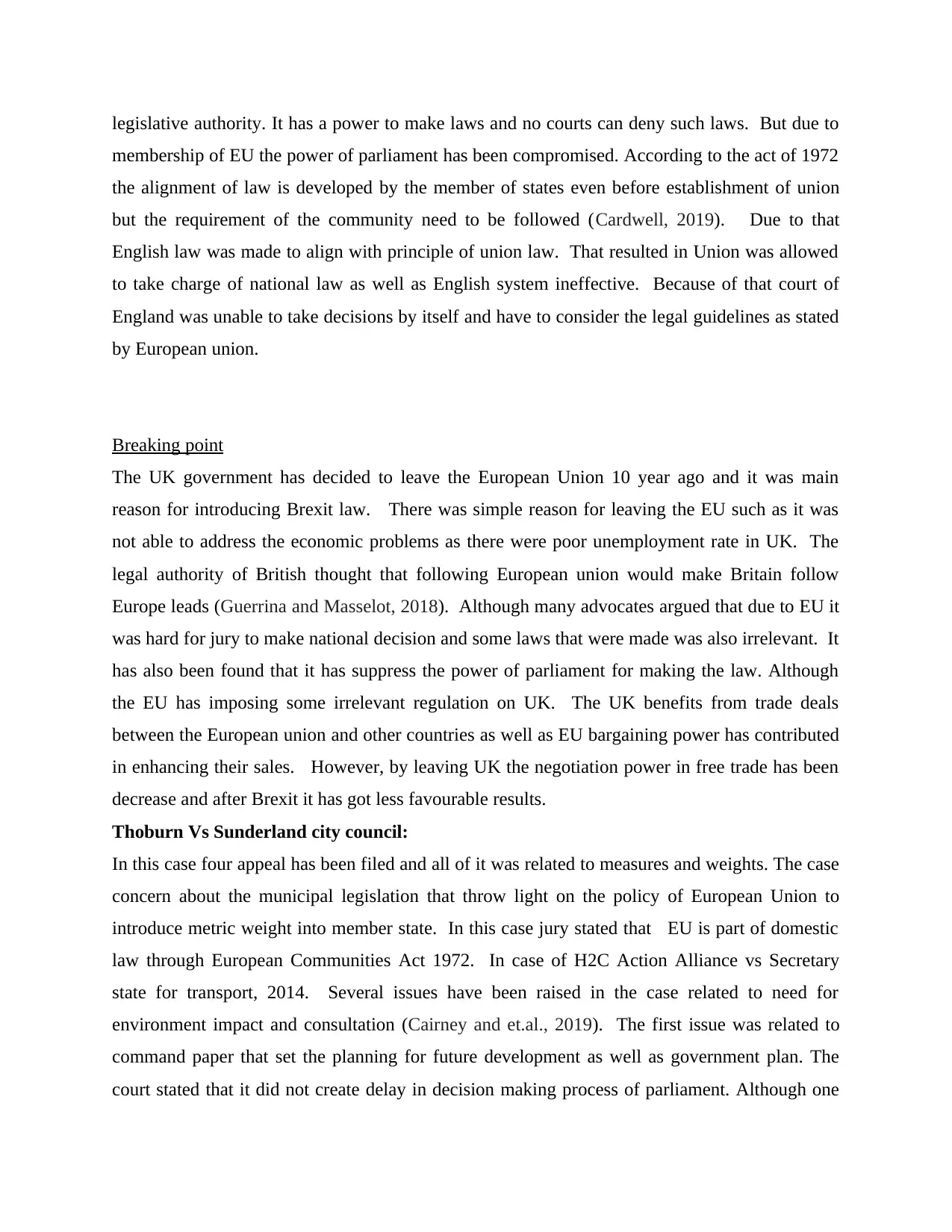
legislative authority. It has a power to make laws and no courts can deny such laws. But due to
membership of EU the power of parliament has been compromised. According to the act of 1972
the alignment of law is developed by the member of states even before establishment of union
but the requirement of the community need to be followed (Cardwell, 2019). Due to that
English law was made to align with principle of union law. That resulted in Union was allowed
to take charge of national law as well as English system ineffective. Because of that court of
England was unable to take decisions by itself and have to consider the legal guidelines as stated
by European union.
Breaking point
The UK government has decided to leave the European Union 10 year ago and it was main
reason for introducing Brexit law. There was simple reason for leaving the EU such as it was
not able to address the economic problems as there were poor unemployment rate in UK. The
legal authority of British thought that following European union would make Britain follow
Europe leads (Guerrina and Masselot, 2018). Although many advocates argued that due to EU it
was hard for jury to make national decision and some laws that were made was also irrelevant. It
has also been found that it has suppress the power of parliament for making the law. Although
the EU has imposing some irrelevant regulation on UK. The UK benefits from trade deals
between the European union and other countries as well as EU bargaining power has contributed
in enhancing their sales. However, by leaving UK the negotiation power in free trade has been
decrease and after Brexit it has got less favourable results.
Thoburn Vs Sunderland city council:
In this case four appeal has been filed and all of it was related to measures and weights. The case
concern about the municipal legislation that throw light on the policy of European Union to
introduce metric weight into member state. In this case jury stated that EU is part of domestic
law through European Communities Act 1972. In case of H2C Action Alliance vs Secretary
state for transport, 2014. Several issues have been raised in the case related to need for
environment impact and consultation (Cairney and et.al., 2019). The first issue was related to
command paper that set the planning for future development as well as government plan. The
court stated that it did not create delay in decision making process of parliament. Although one
membership of EU the power of parliament has been compromised. According to the act of 1972
the alignment of law is developed by the member of states even before establishment of union
but the requirement of the community need to be followed (Cardwell, 2019). Due to that
English law was made to align with principle of union law. That resulted in Union was allowed
to take charge of national law as well as English system ineffective. Because of that court of
England was unable to take decisions by itself and have to consider the legal guidelines as stated
by European union.
Breaking point
The UK government has decided to leave the European Union 10 year ago and it was main
reason for introducing Brexit law. There was simple reason for leaving the EU such as it was
not able to address the economic problems as there were poor unemployment rate in UK. The
legal authority of British thought that following European union would make Britain follow
Europe leads (Guerrina and Masselot, 2018). Although many advocates argued that due to EU it
was hard for jury to make national decision and some laws that were made was also irrelevant. It
has also been found that it has suppress the power of parliament for making the law. Although
the EU has imposing some irrelevant regulation on UK. The UK benefits from trade deals
between the European union and other countries as well as EU bargaining power has contributed
in enhancing their sales. However, by leaving UK the negotiation power in free trade has been
decrease and after Brexit it has got less favourable results.
Thoburn Vs Sunderland city council:
In this case four appeal has been filed and all of it was related to measures and weights. The case
concern about the municipal legislation that throw light on the policy of European Union to
introduce metric weight into member state. In this case jury stated that EU is part of domestic
law through European Communities Act 1972. In case of H2C Action Alliance vs Secretary
state for transport, 2014. Several issues have been raised in the case related to need for
environment impact and consultation (Cairney and et.al., 2019). The first issue was related to
command paper that set the planning for future development as well as government plan. The
court stated that it did not create delay in decision making process of parliament. Although one
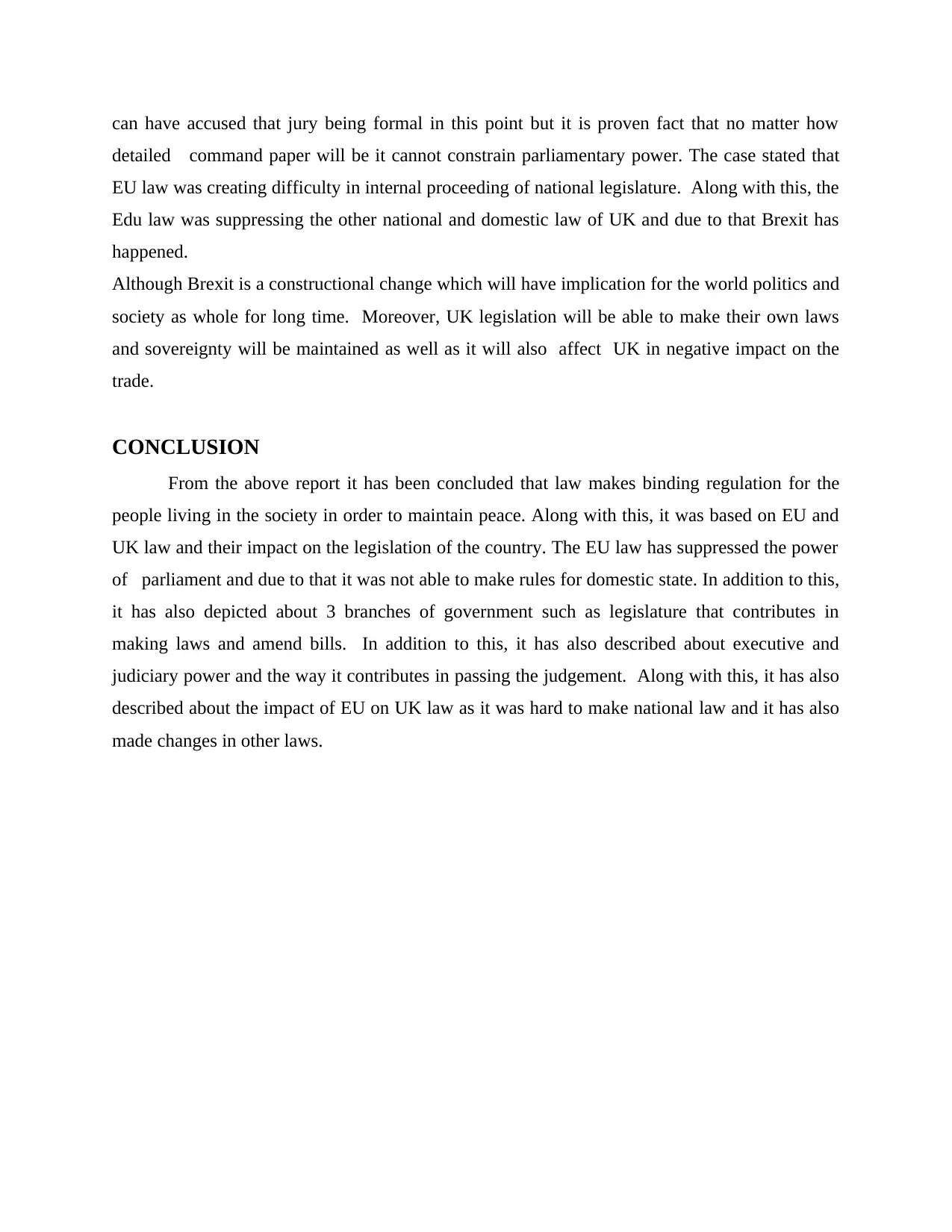
can have accused that jury being formal in this point but it is proven fact that no matter how
detailed command paper will be it cannot constrain parliamentary power. The case stated that
EU law was creating difficulty in internal proceeding of national legislature. Along with this, the
Edu law was suppressing the other national and domestic law of UK and due to that Brexit has
happened.
Although Brexit is a constructional change which will have implication for the world politics and
society as whole for long time. Moreover, UK legislation will be able to make their own laws
and sovereignty will be maintained as well as it will also affect UK in negative impact on the
trade.
CONCLUSION
From the above report it has been concluded that law makes binding regulation for the
people living in the society in order to maintain peace. Along with this, it was based on EU and
UK law and their impact on the legislation of the country. The EU law has suppressed the power
of parliament and due to that it was not able to make rules for domestic state. In addition to this,
it has also depicted about 3 branches of government such as legislature that contributes in
making laws and amend bills. In addition to this, it has also described about executive and
judiciary power and the way it contributes in passing the judgement. Along with this, it has also
described about the impact of EU on UK law as it was hard to make national law and it has also
made changes in other laws.
detailed command paper will be it cannot constrain parliamentary power. The case stated that
EU law was creating difficulty in internal proceeding of national legislature. Along with this, the
Edu law was suppressing the other national and domestic law of UK and due to that Brexit has
happened.
Although Brexit is a constructional change which will have implication for the world politics and
society as whole for long time. Moreover, UK legislation will be able to make their own laws
and sovereignty will be maintained as well as it will also affect UK in negative impact on the
trade.
CONCLUSION
From the above report it has been concluded that law makes binding regulation for the
people living in the society in order to maintain peace. Along with this, it was based on EU and
UK law and their impact on the legislation of the country. The EU law has suppressed the power
of parliament and due to that it was not able to make rules for domestic state. In addition to this,
it has also depicted about 3 branches of government such as legislature that contributes in
making laws and amend bills. In addition to this, it has also described about executive and
judiciary power and the way it contributes in passing the judgement. Along with this, it has also
described about the impact of EU on UK law as it was hard to make national law and it has also
made changes in other laws.
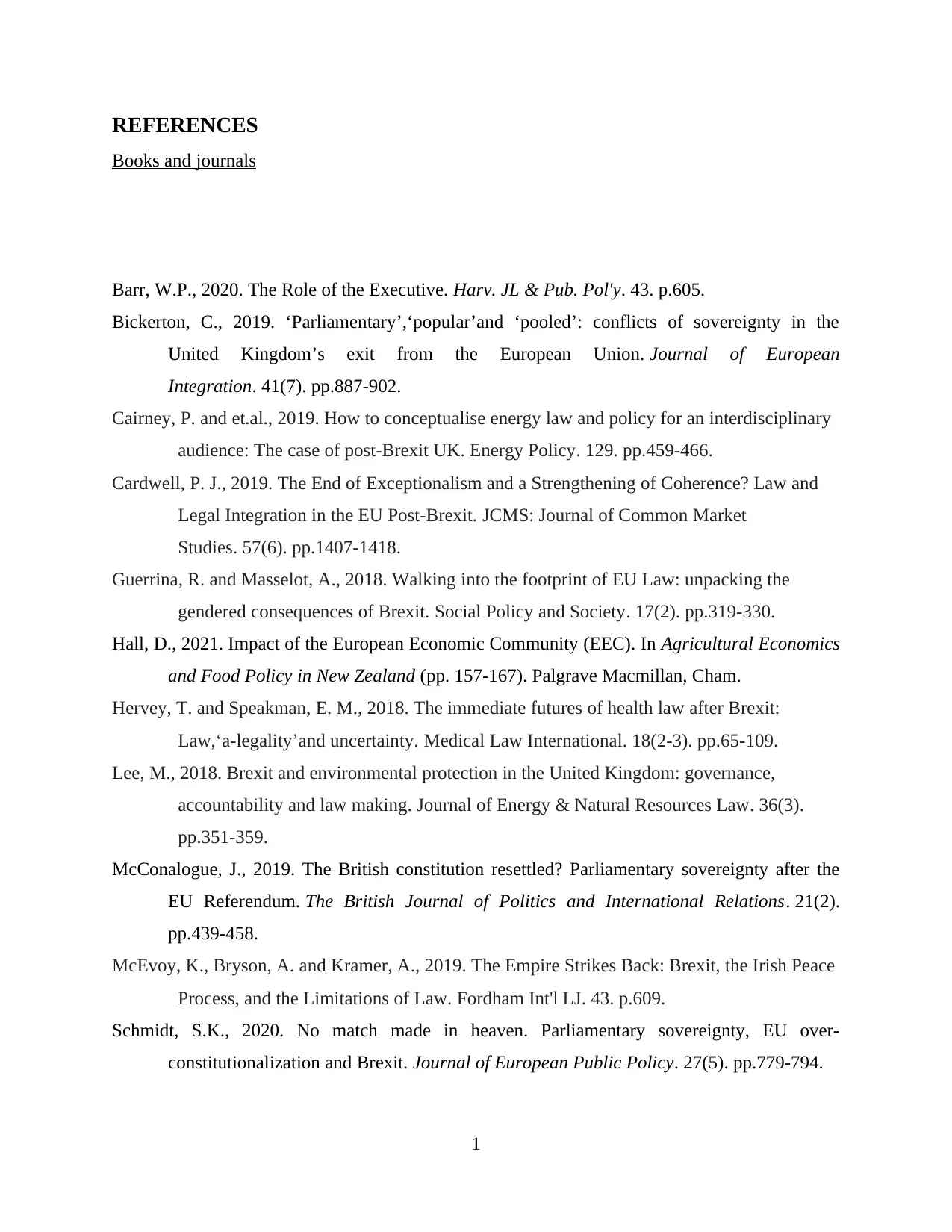
REFERENCES
Books and journals
Barr, W.P., 2020. The Role of the Executive. Harv. JL & Pub. Pol'y. 43. p.605.
Bickerton, C., 2019. ‘Parliamentary’,‘popular’and ‘pooled’: conflicts of sovereignty in the
United Kingdom’s exit from the European Union. Journal of European
Integration. 41(7). pp.887-902.
Cairney, P. and et.al., 2019. How to conceptualise energy law and policy for an interdisciplinary
audience: The case of post-Brexit UK. Energy Policy. 129. pp.459-466.
Cardwell, P. J., 2019. The End of Exceptionalism and a Strengthening of Coherence? Law and
Legal Integration in the EU Post‐Brexit. JCMS: Journal of Common Market
Studies. 57(6). pp.1407-1418.
Guerrina, R. and Masselot, A., 2018. Walking into the footprint of EU Law: unpacking the
gendered consequences of Brexit. Social Policy and Society. 17(2). pp.319-330.
Hall, D., 2021. Impact of the European Economic Community (EEC). In Agricultural Economics
and Food Policy in New Zealand (pp. 157-167). Palgrave Macmillan, Cham.
Hervey, T. and Speakman, E. M., 2018. The immediate futures of health law after Brexit:
Law,‘a-legality’and uncertainty. Medical Law International. 18(2-3). pp.65-109.
Lee, M., 2018. Brexit and environmental protection in the United Kingdom: governance,
accountability and law making. Journal of Energy & Natural Resources Law. 36(3).
pp.351-359.
McConalogue, J., 2019. The British constitution resettled? Parliamentary sovereignty after the
EU Referendum. The British Journal of Politics and International Relations. 21(2).
pp.439-458.
McEvoy, K., Bryson, A. and Kramer, A., 2019. The Empire Strikes Back: Brexit, the Irish Peace
Process, and the Limitations of Law. Fordham Int'l LJ. 43. p.609.
Schmidt, S.K., 2020. No match made in heaven. Parliamentary sovereignty, EU over-
constitutionalization and Brexit. Journal of European Public Policy. 27(5). pp.779-794.
1
Books and journals
Barr, W.P., 2020. The Role of the Executive. Harv. JL & Pub. Pol'y. 43. p.605.
Bickerton, C., 2019. ‘Parliamentary’,‘popular’and ‘pooled’: conflicts of sovereignty in the
United Kingdom’s exit from the European Union. Journal of European
Integration. 41(7). pp.887-902.
Cairney, P. and et.al., 2019. How to conceptualise energy law and policy for an interdisciplinary
audience: The case of post-Brexit UK. Energy Policy. 129. pp.459-466.
Cardwell, P. J., 2019. The End of Exceptionalism and a Strengthening of Coherence? Law and
Legal Integration in the EU Post‐Brexit. JCMS: Journal of Common Market
Studies. 57(6). pp.1407-1418.
Guerrina, R. and Masselot, A., 2018. Walking into the footprint of EU Law: unpacking the
gendered consequences of Brexit. Social Policy and Society. 17(2). pp.319-330.
Hall, D., 2021. Impact of the European Economic Community (EEC). In Agricultural Economics
and Food Policy in New Zealand (pp. 157-167). Palgrave Macmillan, Cham.
Hervey, T. and Speakman, E. M., 2018. The immediate futures of health law after Brexit:
Law,‘a-legality’and uncertainty. Medical Law International. 18(2-3). pp.65-109.
Lee, M., 2018. Brexit and environmental protection in the United Kingdom: governance,
accountability and law making. Journal of Energy & Natural Resources Law. 36(3).
pp.351-359.
McConalogue, J., 2019. The British constitution resettled? Parliamentary sovereignty after the
EU Referendum. The British Journal of Politics and International Relations. 21(2).
pp.439-458.
McEvoy, K., Bryson, A. and Kramer, A., 2019. The Empire Strikes Back: Brexit, the Irish Peace
Process, and the Limitations of Law. Fordham Int'l LJ. 43. p.609.
Schmidt, S.K., 2020. No match made in heaven. Parliamentary sovereignty, EU over-
constitutionalization and Brexit. Journal of European Public Policy. 27(5). pp.779-794.
1
Paraphrase This Document
Need a fresh take? Get an instant paraphrase of this document with our AI Paraphraser

2
1 out of 8
Your All-in-One AI-Powered Toolkit for Academic Success.
+13062052269
info@desklib.com
Available 24*7 on WhatsApp / Email
![[object Object]](/_next/static/media/star-bottom.7253800d.svg)
Unlock your academic potential
© 2024 | Zucol Services PVT LTD | All rights reserved.




